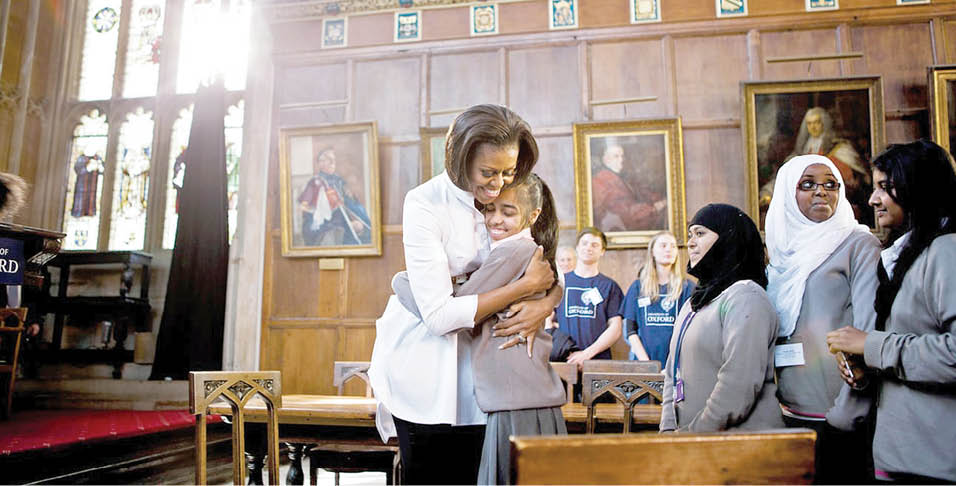Becoming is laden with inspirational symbolism and patriotic platitudes – but this reflects the wider pressure to use language approved by others, writes Yiyun Li
Two years ago I drove my son and a friend of his to an event. They were 15, and discussing the girl’s decision not to participate in a poetry contest at her school. She had read the previous winners’ poems, she said. They were composed of words such as injustice, inequality, empowerment, action and descriptions of police brutality, of which, the girl pointed out, none of the poets would have direct knowledge. (She was right: she goes to one of the most preppy high schools in the San Francisco Bay Area.)
“What I don’t understand is -” the girl said, “why can’t we write about flowers any more.”
“Of course we can,” my son said. “But …”
He did not finish the sentence. I wondered if the two children were asking: is there still a place for Emily Dickinson in the US? Or else: what kind of language should we use if we want to be commended, or, simply, to belong? Even, not to be punished?
When a student of mine wrote a story set in her native rural Virginia, a pot of African violets led to harsh comments from her peers. The flower should be read as a symbol of racism and xenophobia, the critics said, which the author failed to emphasise. The student said to me afterwards: I thought it was only a flower; I should be more careful next time.
This awareness of the audience may mean that their need becomes the priority. It is perhaps unavoidable in a memoir by a public figure. Michelle Obama’s memoir, ‘Becoming’, delivers what it promises: her triumphant life journey from Chicago’s South Side to the White House, with intimate moments to connect with readers, and stirring passages to inspire. But one wishes that someone of her calibre could have defied that convention. I realise that, by expressing this doubt, I may be inviting criticism myself. “The believer will fight another believer over a shade of difference: the doubter fights only with himself,” says Father Quixote, my favourite Graham Greene character. One may as well armour oneself as Quixote does before speaking one’s mind.
I have been thinking about a set of words that stood out for me in Becoming: symbol, symbolic, symbolism. The White House vegetable garden “was designed to be a symbol of nutrition and healthy living”. Part of the White House, museum-like, is where “symbolism lived and mattered”. Queen Elizabeth II is “a living symbol and well practised at managing it”. Barack’s presidency was in part “the symbolism of the moment”, and he was held up as “the leader and the symbol for the country itself”. And then there were the restraints Michelle Obama experienced, herself having to live as a symbol under the title of first lady.
I have noticed that students, in reading and analysing literature, often gravitate toward symbols, and many of them, in writing fiction, strive to create characters and actions that can be elevated to a symbolic level. These inclinations come at a cost. Characters conscripted to serve, and to serve as, symbols are obliged to follow a more predictable script.
In a chapter titled “Symbolon”, in Anne Carson’s Eros the Bittersweet, she writes: “‘To give names to nameless things by transference [metaphora] from things kindred or similar in appearance’ is how Aristotle describes the function of metaphor.” To approximate what cannot be achieved is a gesture of humility, but symbols, we often see now, serve too eloquently the already named.
The problems that have been named in the US – racism, xenophobia, poverty, class inequality, gender inequality – are all too real. I can tell my share of stories. But talking about them in symbolic terms turns them into something else: they become a collective narrative that demands to be the most righteous or the only legitimate way to look at the world. Thus parents are told not to read The Cat in the Hat by Dr Seuss to their children because of its racism, and a museum is requested to take down. Dreaming by Balthus for his portrayal of a young girl’s body. After I gave a talk about Tolstoy’s work, a woman said to me: you do realise he was a man, and his success was built on females who had to serve him? Another woman questioned why on earth I, as “a person of colour”, would choose to stand behind the canon written by white men.
“People demand freedom of speech as a compensation for the freedom of thought which they seldom use,” Kierkegaard writes. A student, the granddaughter of east-European immigrants, once mused whether, had she been born in a different era, she would have been among the people who had turned in her Jewish neighbours to the Nazis. That she did not first imagine the other scenario, in which she was a heroine hiding her neighbours and saving lives, was refreshing.
To follow any beacon in any given time without questioning first is as alarming as it is to follow propaganda. Having grown up when communist slogans were printed mandatorily next to birthday photographs and an English textbook started with “Long live the Chinese Communist party”, perhaps I’m particularly sensitive to words used to dictate how we should feel and think.
Near the beginning of Becoming, Obama writes that she shared a bedroom with her brother Craig. “The partition between us was so flimsy that we could talk as we lay in bed at night, often tossing a balled sock back and forth through the 10-inch gap between the partition and the ceiling as we did.” Later, as first lady, she visited a high school on the South Side where the students experienced gun violence on a regular basis. The exchange with a student is one of the most candid moments in the book: “‘It’s nice you’re here and all,’ he said with a shrug. ‘But what’re you actually going to do about any of this?’”
Obama acknowledged the students’ circumstances, and then “reminded them those same stories also showed their persistence, self-reliance, and ability to overcome” and “reassured them that they already had what it would take to succeed”. One cannot but wonder how this would have sounded to the young Michelle and Craig.
The student in the above episode and my son’s friend had the intuition to reject any language that did not feel true to their lives. The question, though, is whether they retain this independence when increasingly the pressure to belong is accompanied by the pressure to use the approved language.
Recently, I talked with a scientist whose laboratory had been visited by a high-profile figure in the current administration. Some in the laboratory protested, in a way that made anyone who disagreed with their approach look as though he or she condoned, or even supported, the administration. What’s interesting to me is the language some of the protesters used: by receiving the person, the laboratory “no longer feels like a safe space”. If a child is killed by a passing bullet near his home, the street is not a safe space. If a child is bullied at school, the school is not a safe space. But to transform the laboratory into a contaminated space that threatens the well-being of the people working in it – one wonders if language thus used only becomes a self-soothing way of looking at the world from a moral high ground.
(I cannot help but think about my son and her friend. If we insist in using “a safe space” in a symbolic way, what kind of space is there for the next generation?)
Before the 2016 election, I had a conversation with a student from West Virginia. Where she grew up, she said, there was an abundance of widows, not only old women but also middle-aged and young. Men die in West Virginia, was the simple way she put it. Over the years, when reading my students’ work, I have noticed that the heroic and the progressive and the oppressed characters often get promoted on to symbolic height, both in their suffering and in their triumph. The most memorable characters, however, stay life-sized.
Life – for the widows in West Virginia, for the farmers in Iowa, for my son’s friend and the student in Chicago – is not lived as a symbol. Democracy can be treated in all sorts of metaphorical manners; but an election, vote by vote, is a mathematical reality. “When they go low we go high,” is the epitome of symbolic language. Yet what is the unnamed in the slogan?
One has no doubt that Michelle Obama exercises freedom of thought. One wishes that her memoir made a similar demand on its readers. What if she had chosen to forgo the vocabularies of empowerment and inspiration and patriotism? After all, she is a person who can make herself heard. The language she chooses to use will be incorporated into hundreds of thousands of minds and become infallible truth.
And the girl at the beginning, who refused to put disingenuous words into her poetry: I did in the end hear her read a poem, at the memorial service of a friend of hers. The realest life has no use for symbolic language – that was my thought when I heard her words.
Source: The Guardian UK




